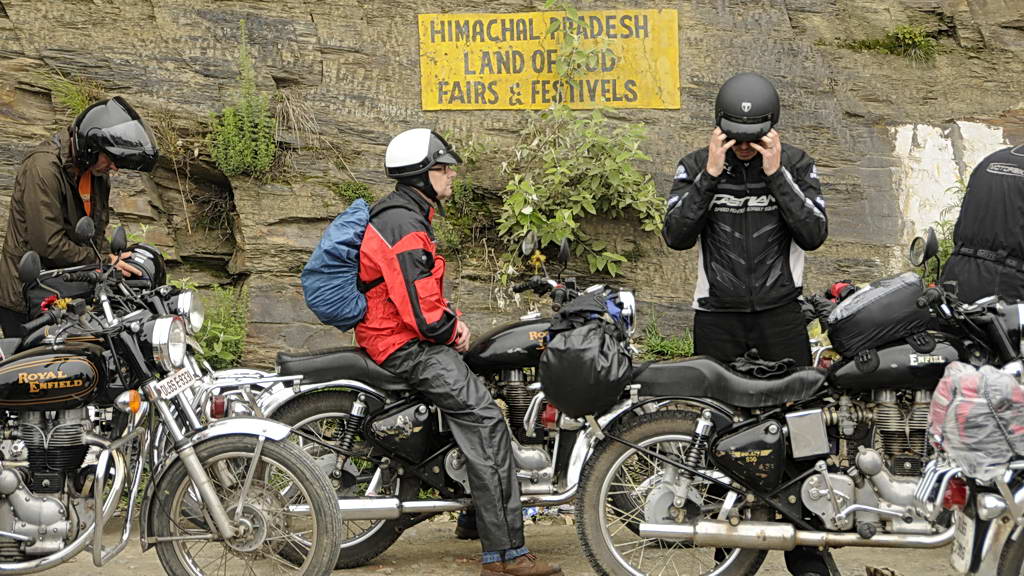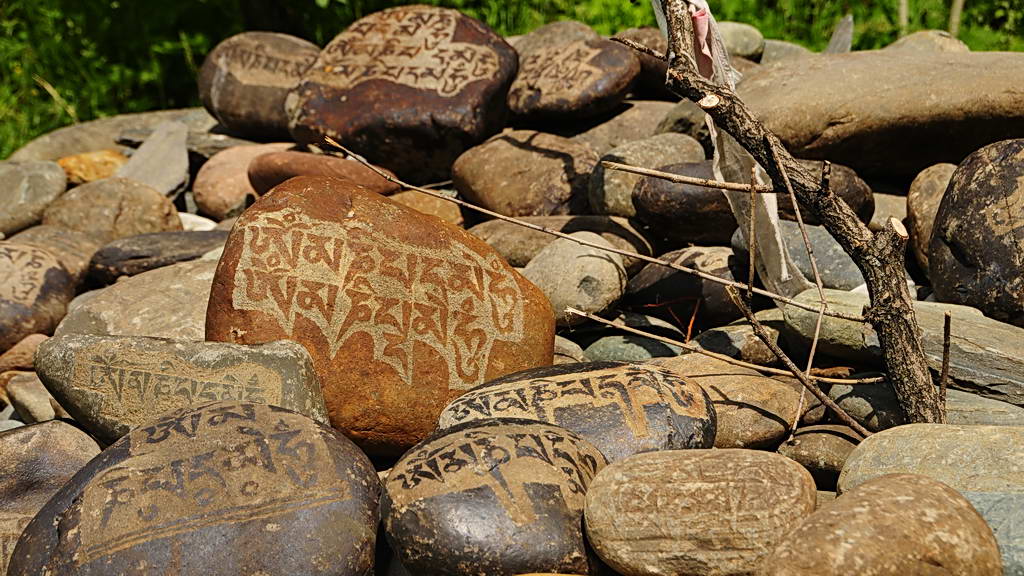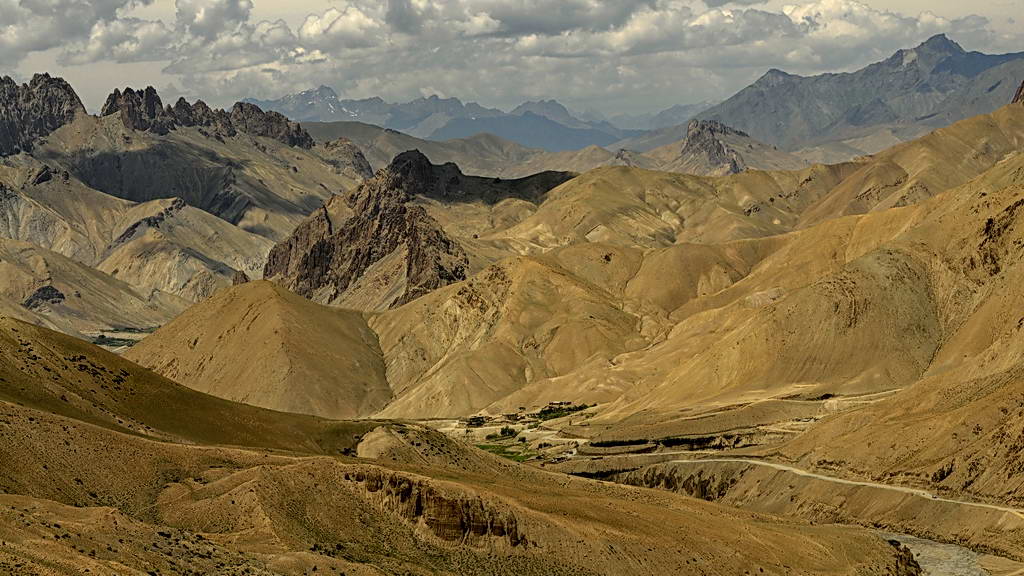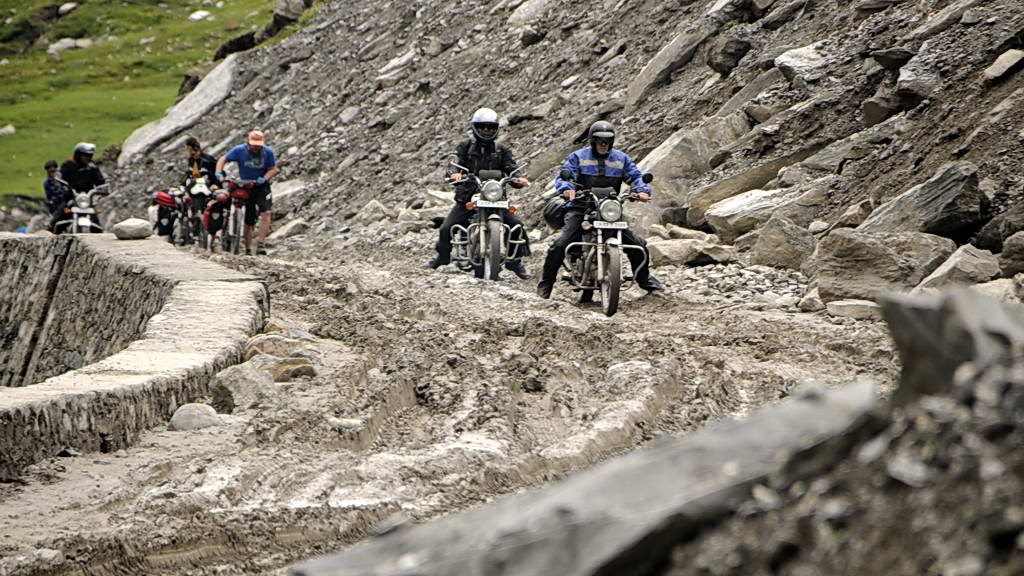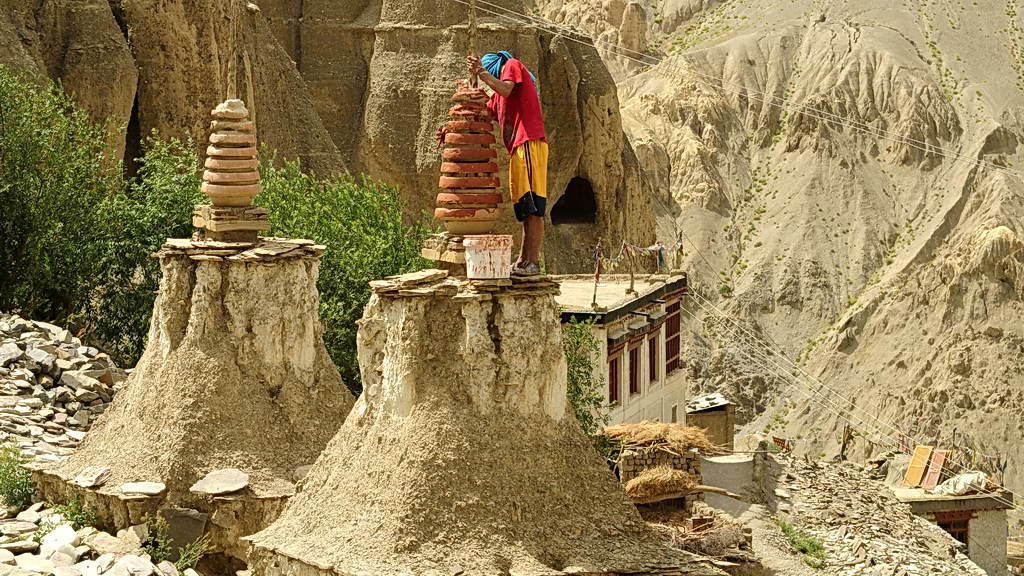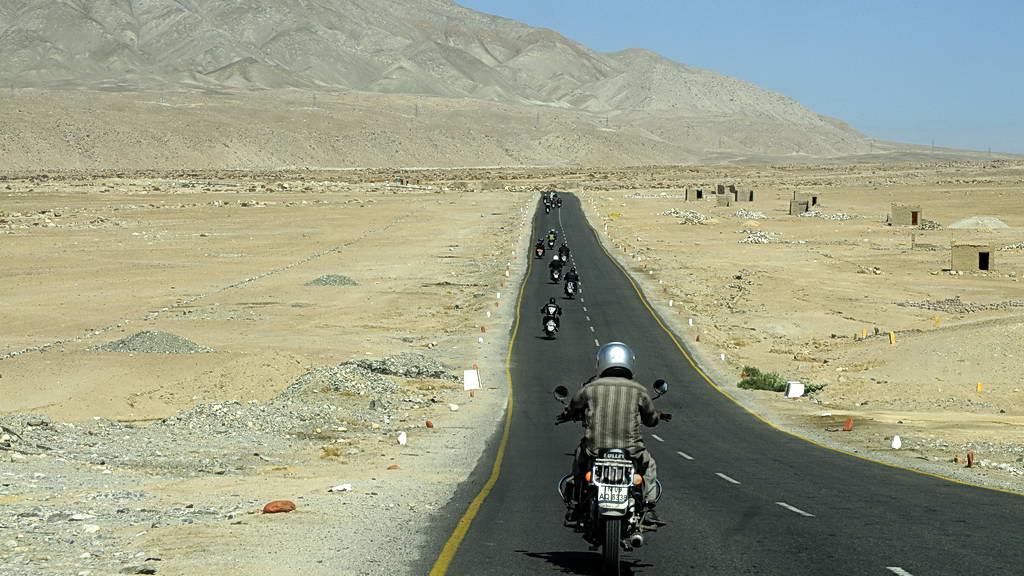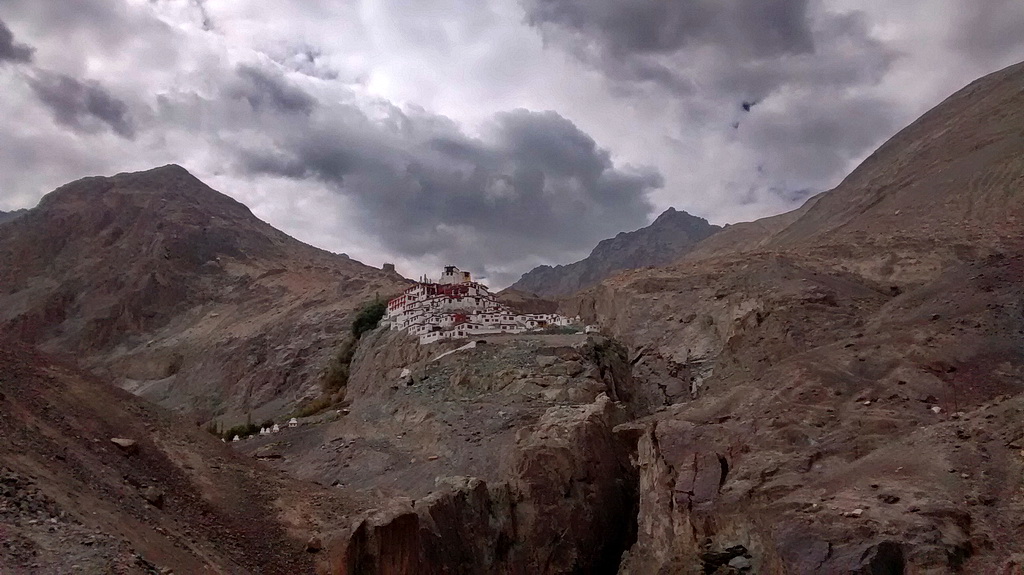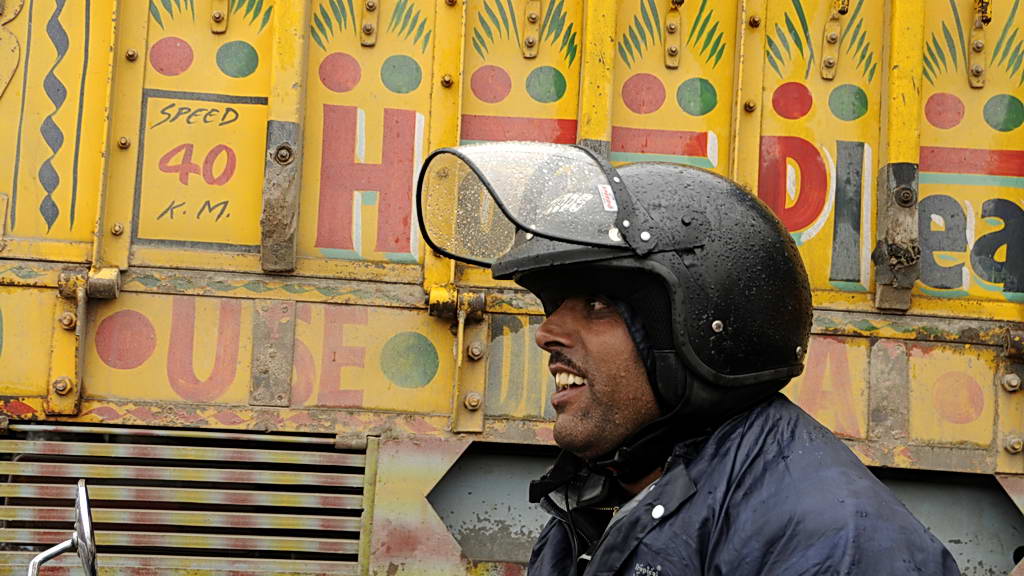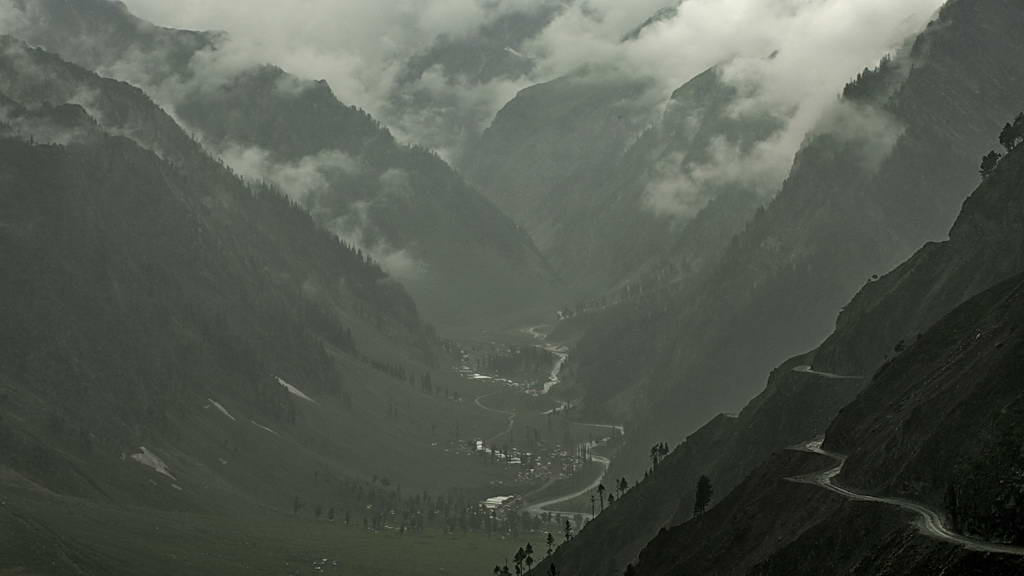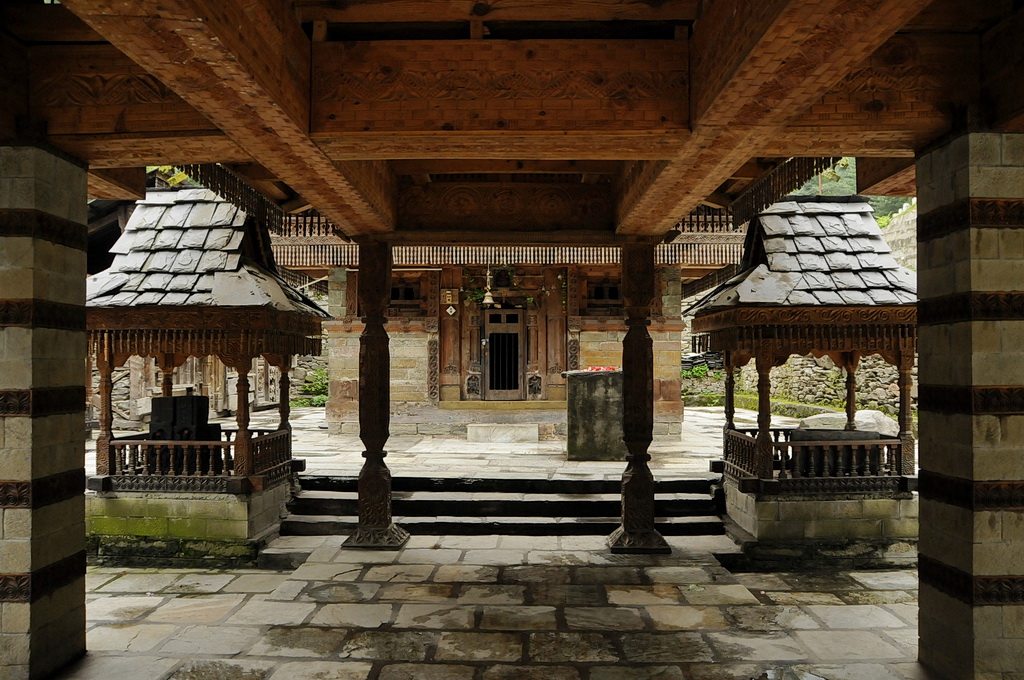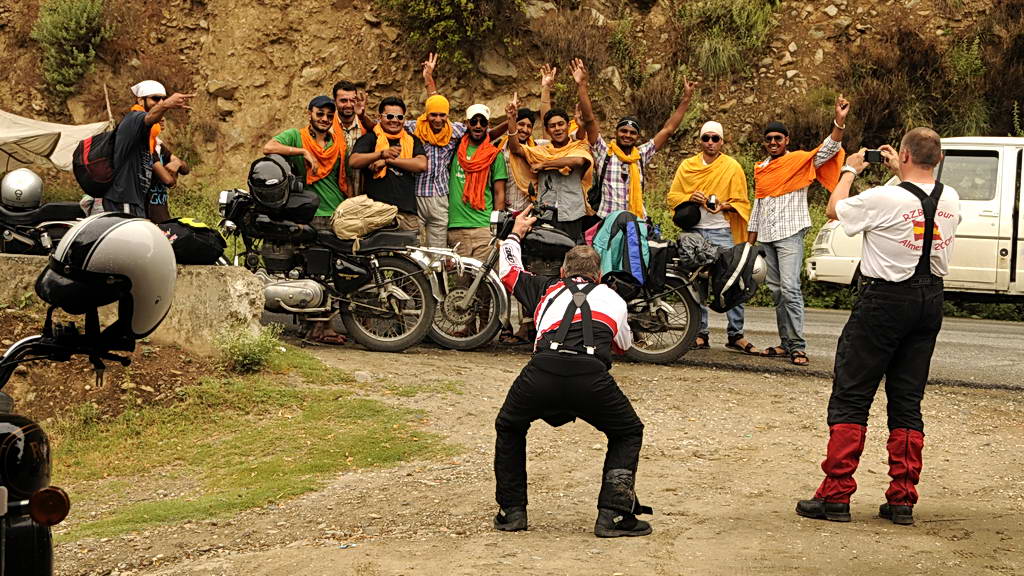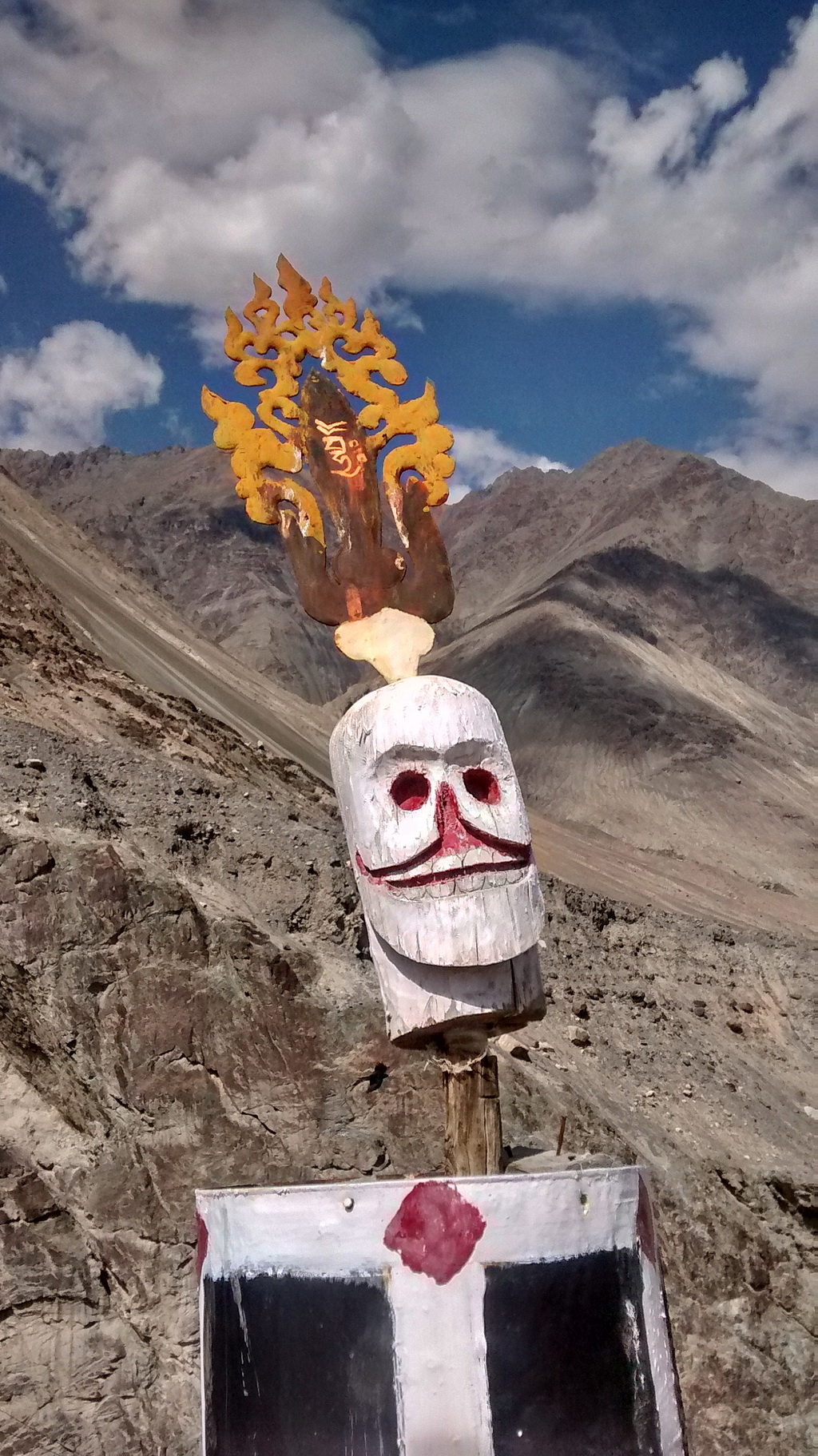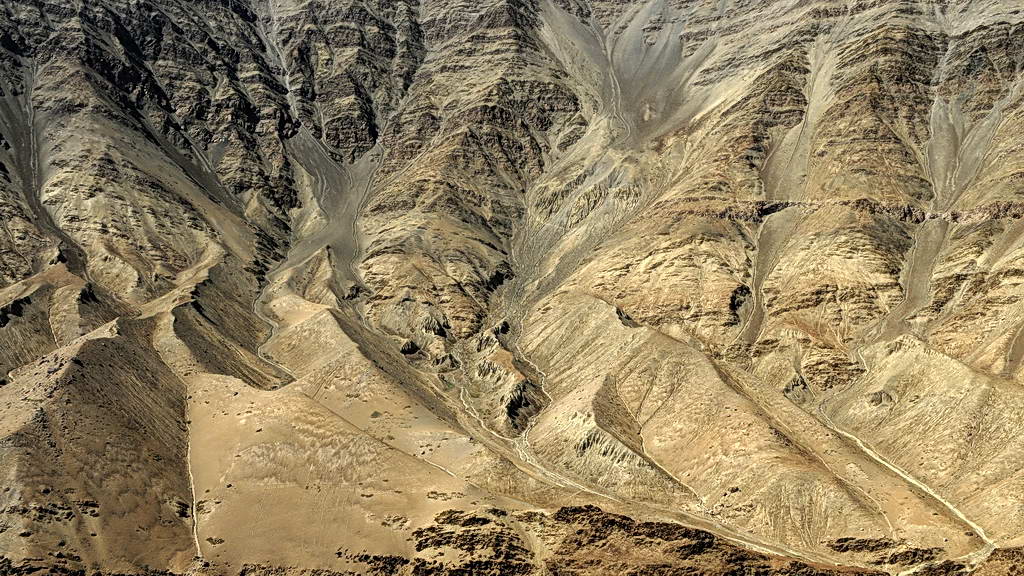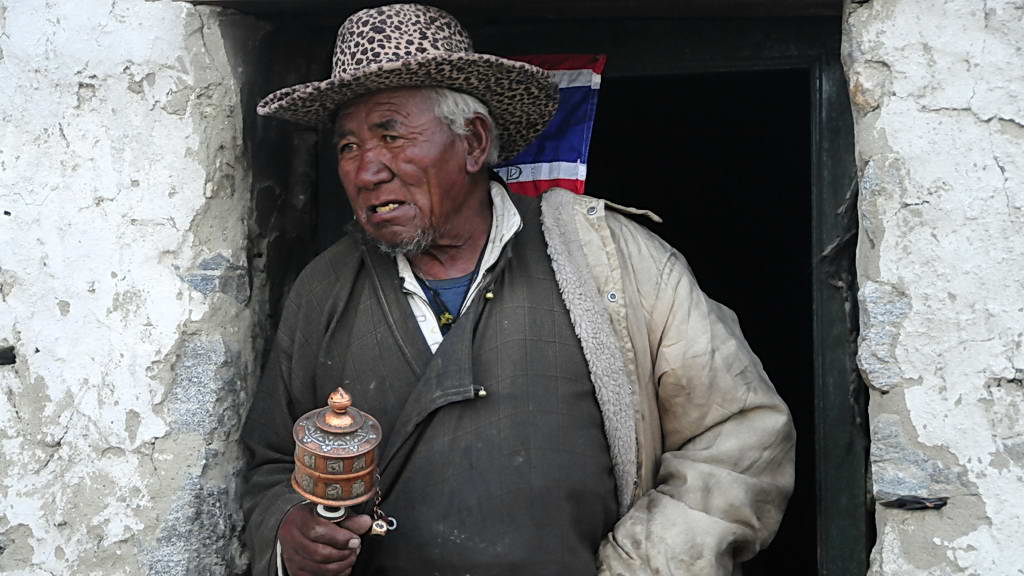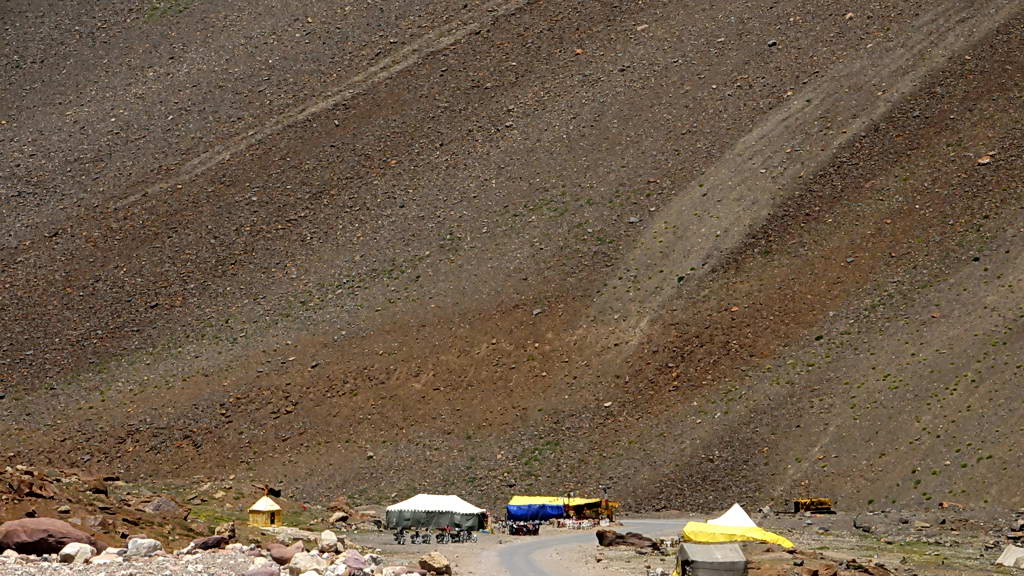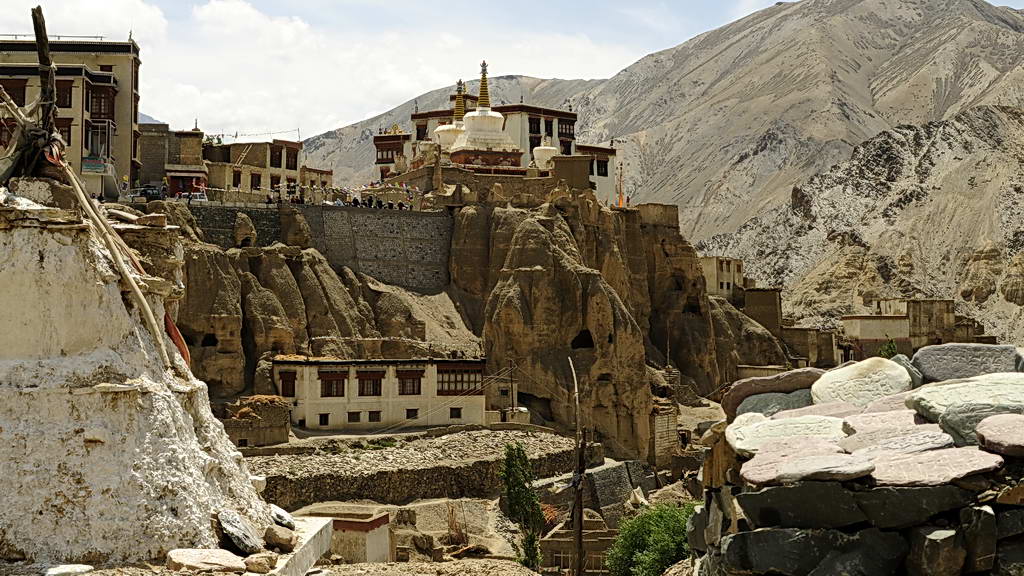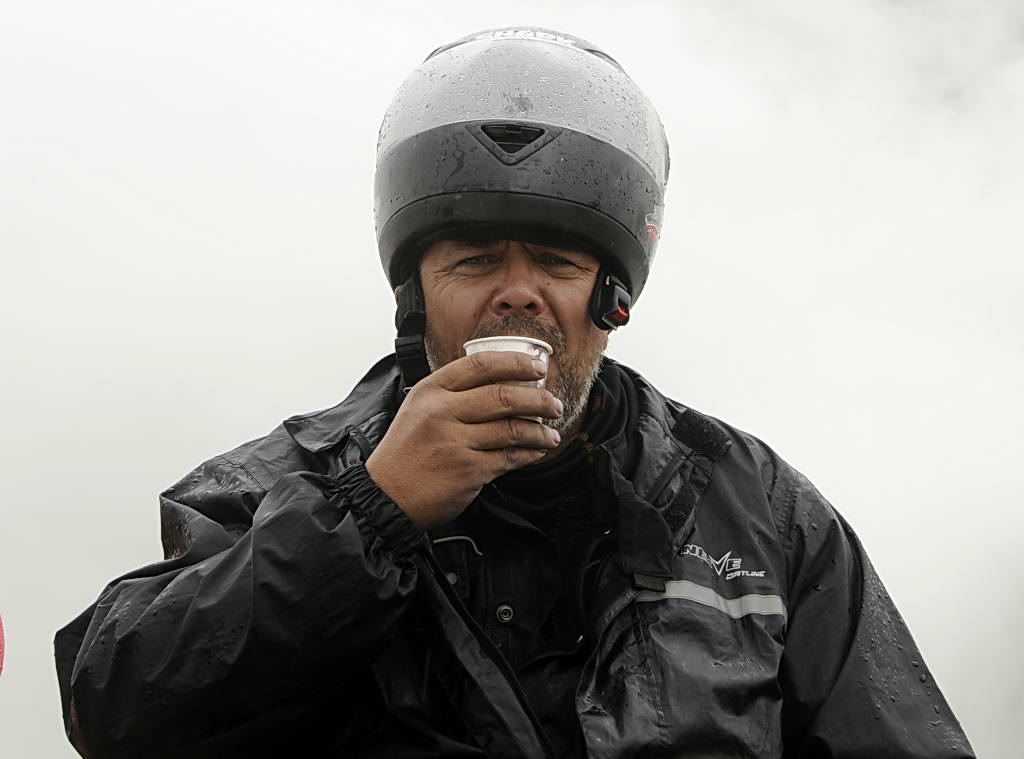Great Ladakh-Kashmir-Trip
Translated into English, Ladakh means "land oft the passes". And really, besides Ladakh, there is no other country in the world with higher roads fit for traffic. In the very North of India, at the upper Indus River, we find this rough area bordering Tibet. Ladakh is an extension of the Tibetan Plateau, therefore also called "Little Tibet".
The first settlers in Ladakh were Buddhist monks who stopped here during their pilgrimage from Tibet to India. In the 9th century, the influence of Ladakh grew far beyond the borders of the Indus valley. In this time, many bastions and palaces have their origins. In the 14th century, a Tibetan pilgrim founded a Buddhist order, at that time known under the name of "Gelupka", the head of which was the first Dalai Lama. Until today, Buddhism is the dominant religion of Ladakh. Everywhere you find Buddhist monasteries. Thousands of believers from all over the world came to this region to hear the lessons of Buddha out of the mouth of the Dalai Lama and other teachers.
On- or Offroad
This is a difficult question. There are roads everywhere, but their condition, even if traces of the old asphalt still may be discovered, is such, that a new definition of the term "road" seems necessary. Many of the drivable roads consist of gravel and sand. If it rains, they turn into slippery mud. Beyond that, we will cross some rivers. That might end in an unintentional mud bath.
In any case, a bike tour in Ladakh means ultimate adventure. The climatic conditions are a permanent challenge for men and machines. In summer, temperatures climb up to 30 degree Celsius, while approaching the freeze point during the night. Roads are blocked from one minute to the next. Landslides, underwashings or political unrests may be the reason. All that poses high demands on the driving performance and the physical condition of the bikers as well as on the reliability of the machines.
And why all that?
The traveler is rewarded for all these troubles by a true feast of the senses, starting with the indescribable variety and beauty of the Himalaya mountain world. Surrounded by the most majestic peaks of this globe, we sometimes cross desolate rubble deserts which lead us to believe that we have landed on the moon. Sometimes our eyes are pampered by lush meadows and softly purling mountain creeks. Contacts with the extraordinarily friendly and amiable population are balm for the soul; the colorfulness and the variety of oriental odors floating through the bazars and markets are a pleasure for eyes and ears.
Concerning food, there are no limits. The Tibetan as well as the North Indian cuisine offers so many varieties that two or three weeks hardly suffice to get a first impression. Those who don&squot;t want Indian food all the time will find numerous international restaurants in Manali or Leh.
Routing
1. Day: Outbound flight
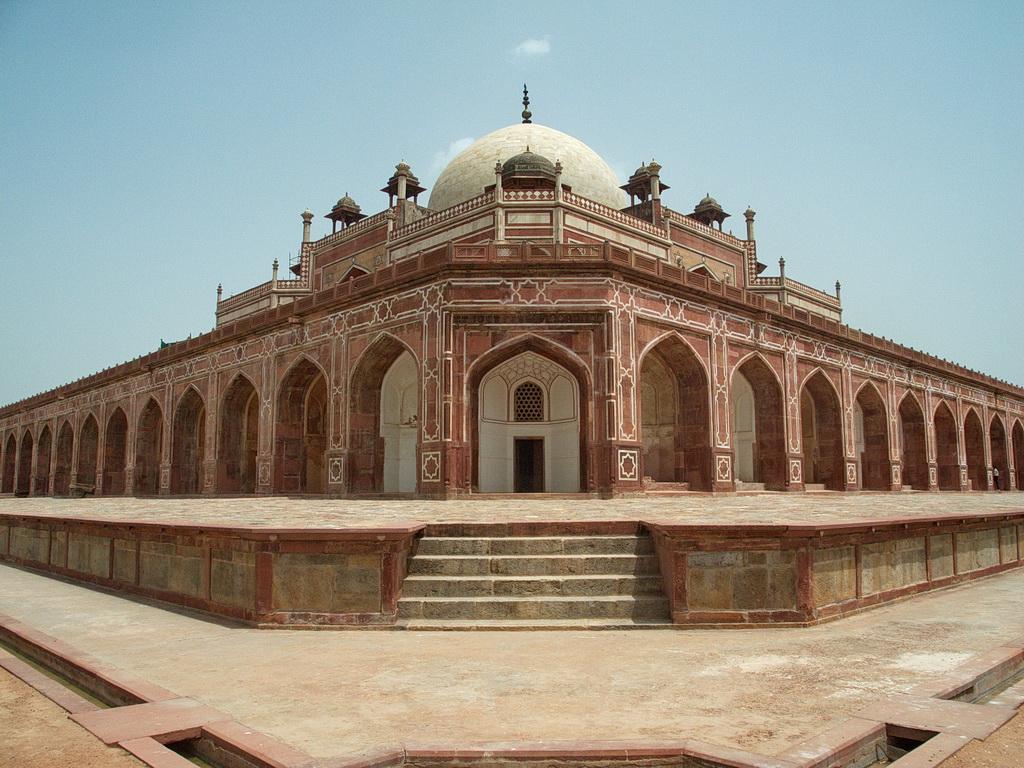
The adventure may begin. Only a few hours separate your familiar way of life from a scenically, climatically, culturally and culinary totally different world.
2. Day: Arrival in Delhi, transfer to Chandigarh
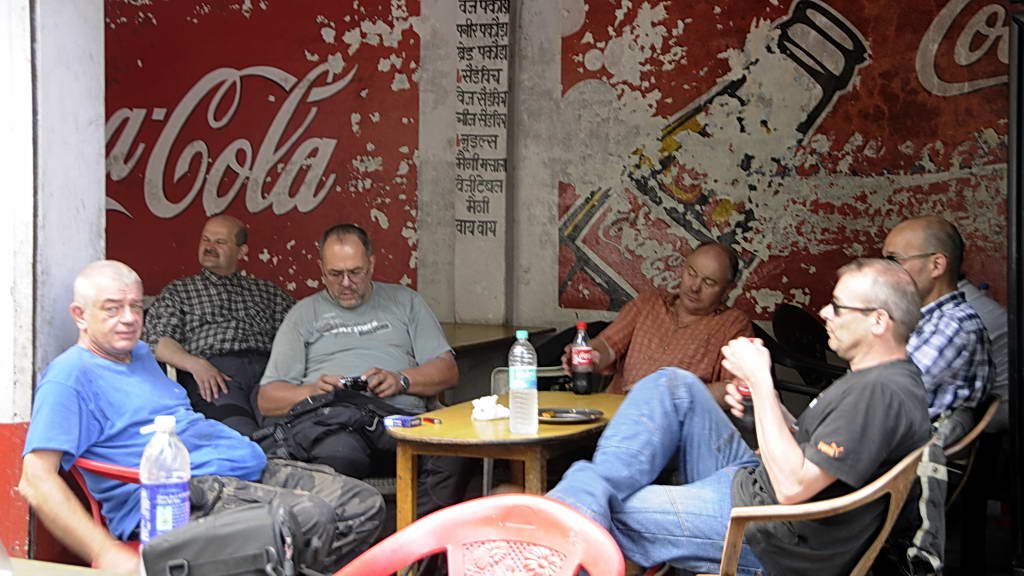
During the night or early morning, your plane will reach New Delhi. Once everybody has arrived, you will be transported by jeep or minibus to Chandigarh (appr. 250 km), today's capital of the Punjab region which was developed on a drawing board. We'll arrive at our hotel in the early afternoon, and you'll have plenty of time to explore this extraordinary city.
Overnight on approx. 375 NHN
3. Day: Chandigarh - Shimla / ca. 135 km
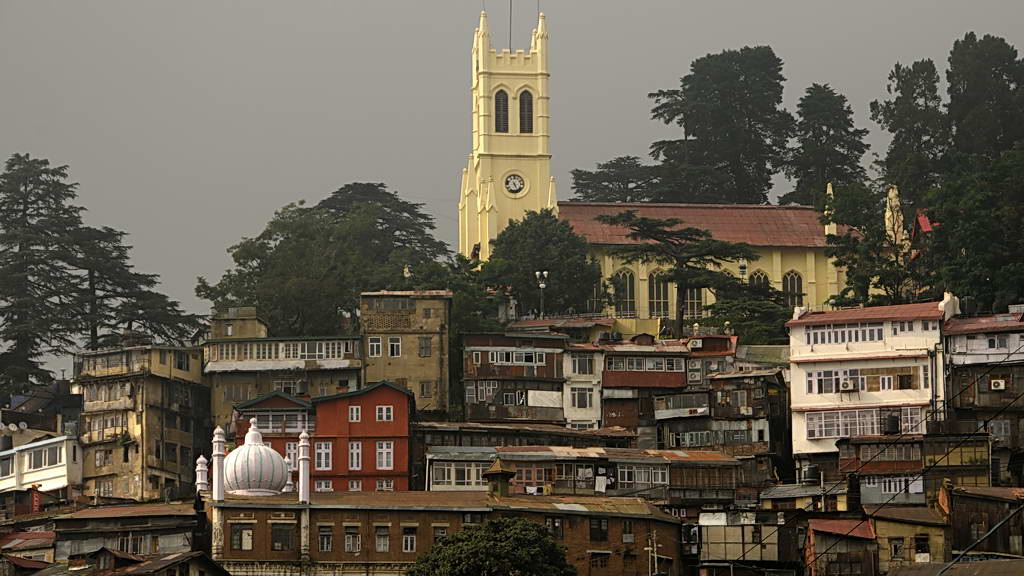
After breakfast, we'll mount our bikes and start on our first tour. The short distance to Shimla, one of the most well-known hill stations of India, will give us a first impression of what we can expect during the coming days. Curve after curve we climb up to a height above 2200 meters. In the afternoon, we'll arrive at the hotel where we can recover from our first motorcycle trip in India.
Overnight on approx. 2.158 NHN
4. Day: Shimla - Chindi / ca. 150 km
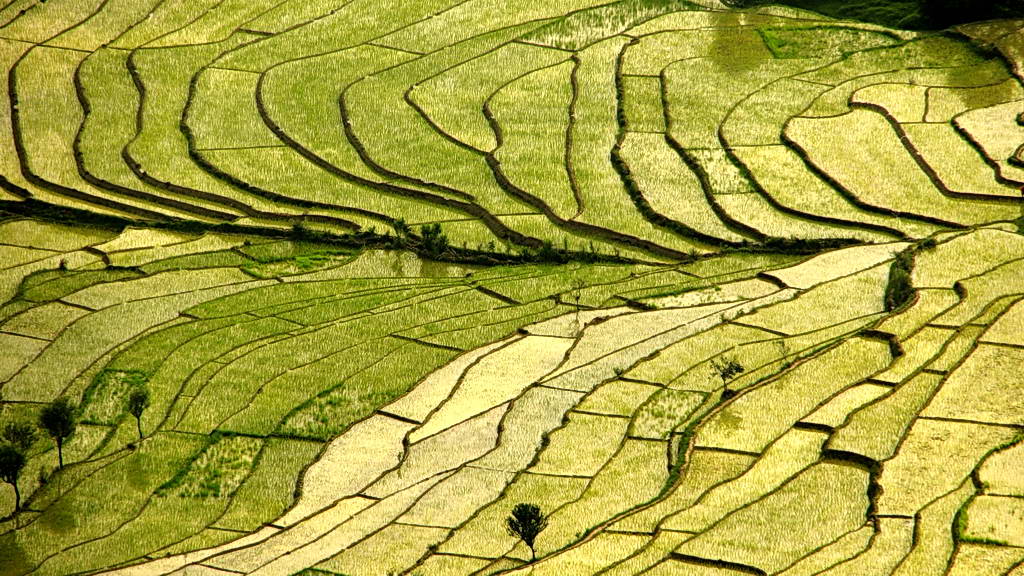
Breakfast. Endless curves, uphill and downhill, are waiting for us. Depending on the weather conditions, we must be prepared for obstructions like landslides and floodings. It is monsoon season in Himachal Pradesh. But only now, the passes are fit for traffic. We are rewarded by a very beautiful landscape, green glowing rice terraces, woody hills and wide meadow valleys.
Overnight on approx. 1.975 NHN
5. Day: Chindi - Rewalsar / ca. 120 km
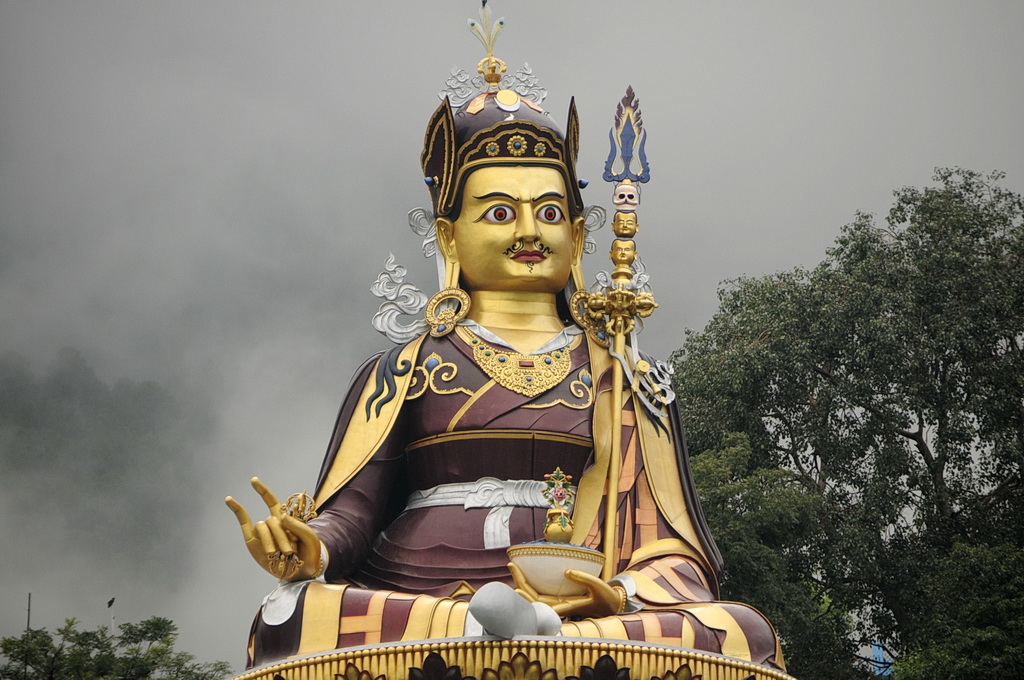
Breakfast. Today's destination is Rewalsar. As yesterday, we'll cross fertile agricultural areas and fruit plantations. The roads are sufficiently curvy. Rewalsar is located near a lake with the same name. It is a very religious town. Hindus, Buddhists and Sikhs peacefully live next to each other. The town's landmark is the gigantic Padmasambhava statue, which is surrounded by numerous exciting stories and myths.
After visiting Rewalsar we continue to Mandi where we will spend the night at Raj Mahal Palace.
Overnight on approx. 760 NHN
6. Day: Rewalsar - Nagar / ca. 115 km
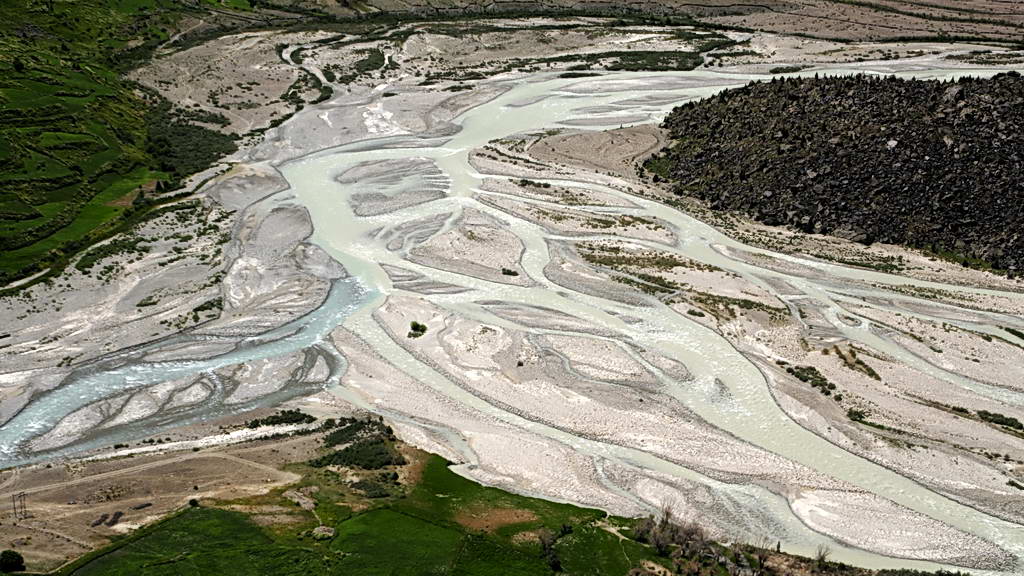
Breakfast. Next station is Nagar near Manali. Before arriving there, we cross the Kullu Valley, the fruit and vegetable garden of India. We'll spend the night in the former royal palace, which the government had beautifully restored and turned into a hotel. From there, we have a breathtaking view over the valley, and on the other side we can see the Himalaya mountain ranges, our goal for the coming days.
Overnight on approx. 1.780 NHN
7. Day: Nagar daytrip / ca. 60 km
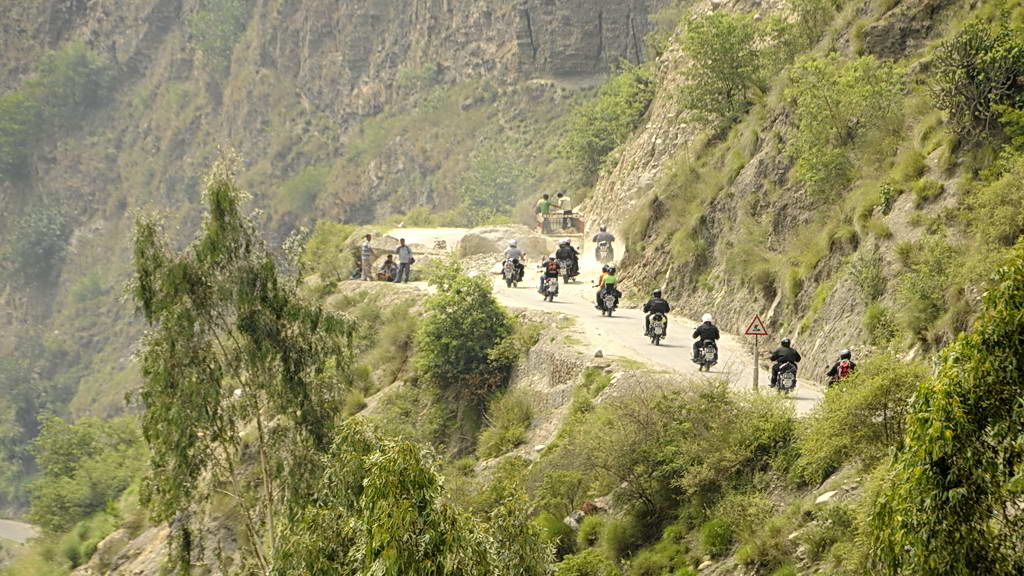
Breakfast. The Indian bureaucracy has come up with a new difficulty for travelers. For crossing the Rohtang-La, you need a permit which you only get in Manali. Therefore we will spend a second night in the beautiful town of Nagar with it its ancient royal palace. We'll spend the day with a trip to some interesting places in the closer environment.
Overnight on approx. 1.780 NHN
8. Day: Nagar - Keylong / ca. 135 km
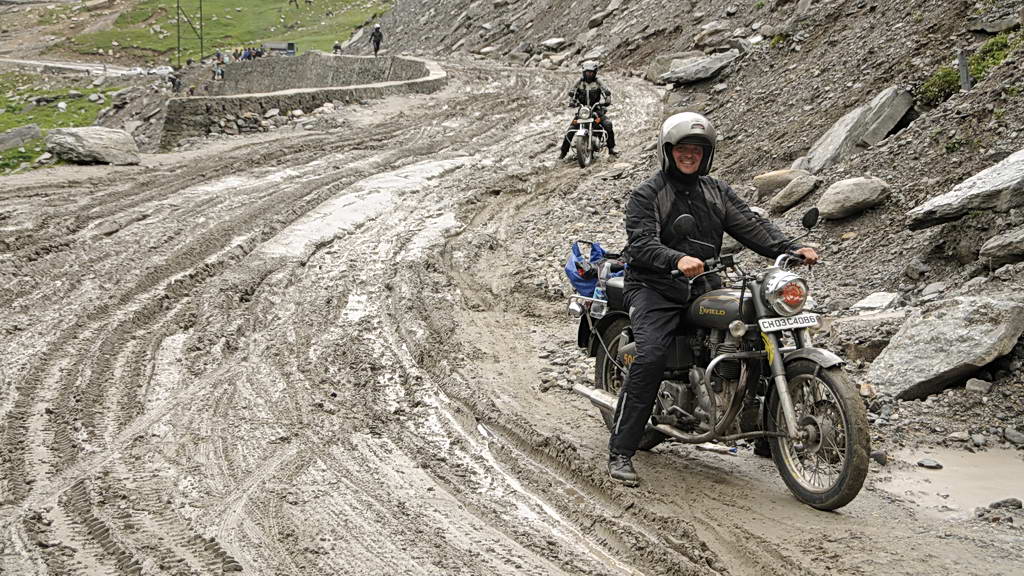
Breakfast. Now it gets serious! Outside Nagar, we have about 40 km through woody hills, before we gradually reach the timber line. Vegetation gets more and more sparse, until we'll be surrounded by mountains only, though covered by many flowers. We cross the Rohtang Pass (3978 m), and in the afternoon we'll arrive in Keylong, today's goal.
Overnight on approx. 3.090 NHN
9. Day: Keylong - Sarchu / ca. 85 km
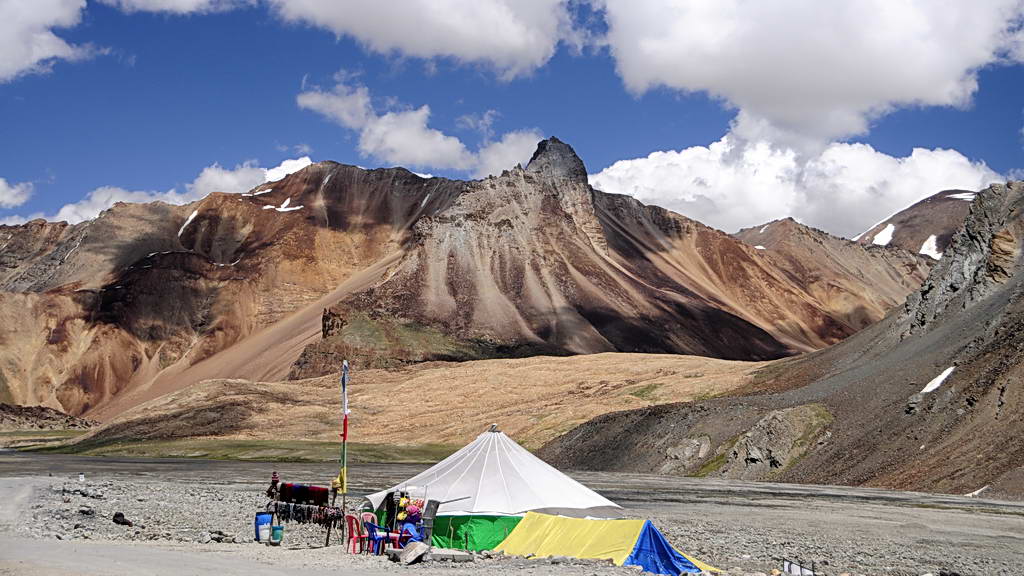
Breakfast. Today we'll cross the 5000 meters limit for the first time. The Baralachla comes pretty close to the clouds with its 5029 meters. Our Enfields are not impressed by that at all. Without any effort, they follow the curvy roads. To the right and to the left, there is nothing but rocks and rubbles. We've reached the moon landscape of Ladakh.
We'll spend the night in a tent camp in Sarchu, 4250 meters above sea level.
10. Day: Sarchu - Leh / ca. 260 km
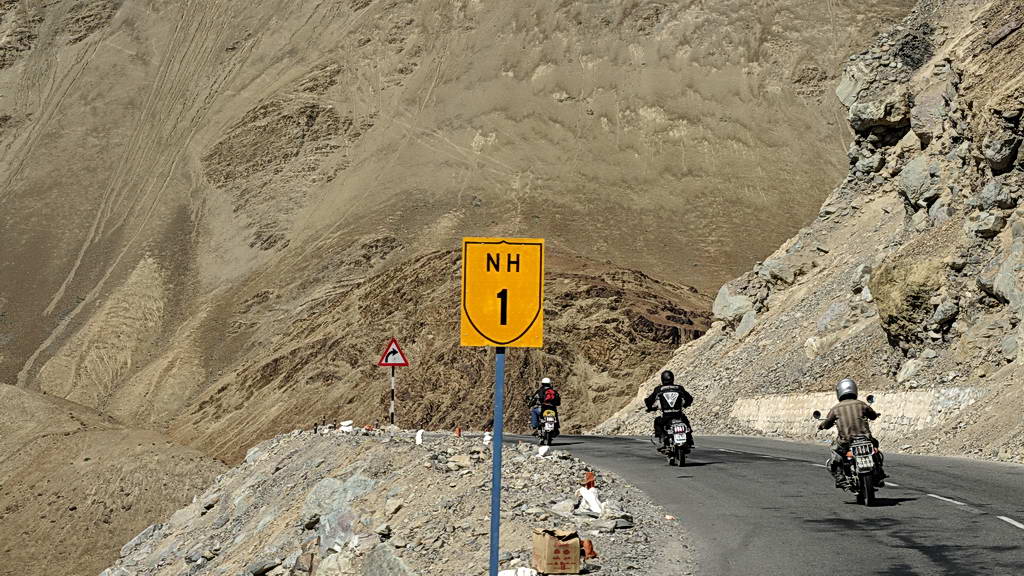
Breakfast. We have the longest and most exhausting part of the trip in front of us. We'll cross three passes. In narrow hairpin curves, we fight for each meter. Depending on the weather conditions, we might have snow. You should bring warm clothing. About 60 km before reaching Leh, the conditions get better, the road is in excellent shape, there is vegetation, and the climate gets more pleasant. In the evening we'll reach our hotel in Leh.
Overnight on approx. 3.500 NHN
11. Day: Day of rest in Leh
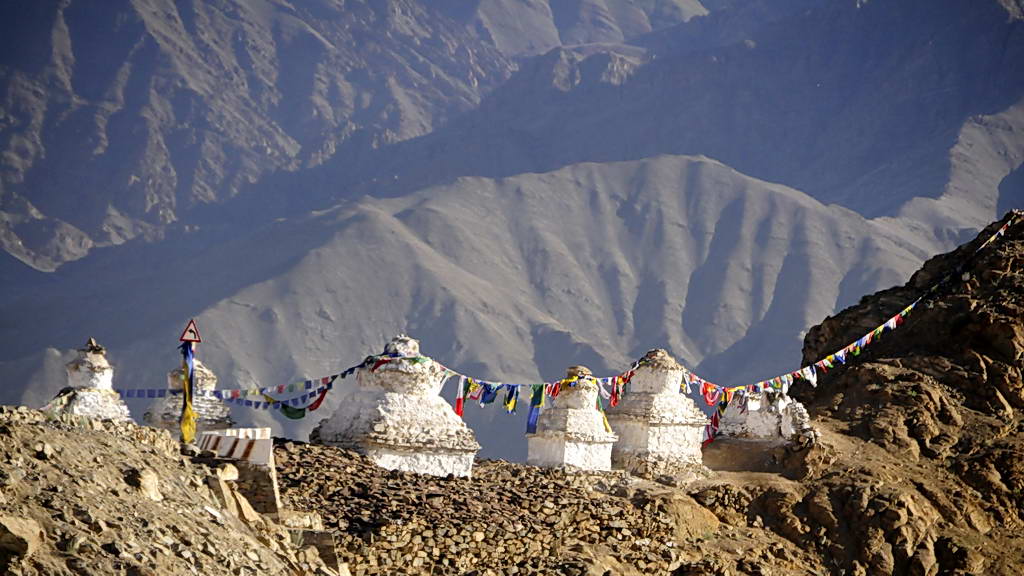
Breakfast. Leh! Who has acquired the taste of it will never want to leave this city again! The calm, friendly manners of the Buddhist population are extremely infectious, and soon you'll have forgotten the last remnants of stress and hecticness. Taking a walk through the narrow streets of the Old Town or sitting in one of the many cafés – relaxing is today's device.
Overnight on approx. 3.500 NHN
12. Day: Leh - Diskit / ca. 115 km
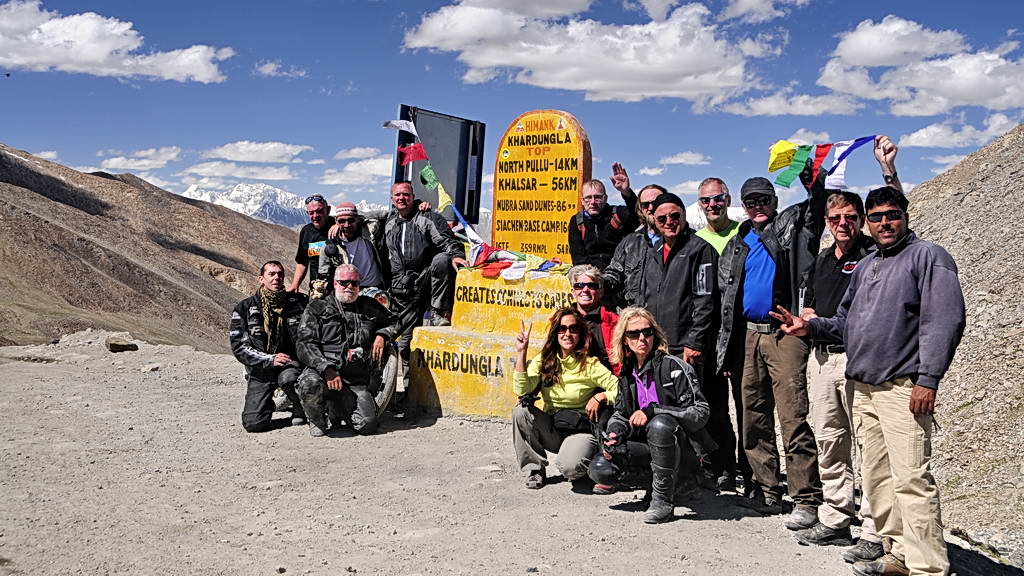
Breakfast. Today we get really high up. Outside Leh, we'll be on the pass road to Kardung La, the supposedly highest traversable pass of the world. Under a cloudless blue sky and beaming sunlight, we'll have a gorgeous view of Leh and the Stok mountain range. At the Kardung-La, we'll enjoy our cup of tea in the highest tea-house of the world and then continue our ride to Diskit in the Nubra Valley, after having taken the obligatory pass pictures.
Overnight on approx. 3.180 NHN
13. Day: Diskit
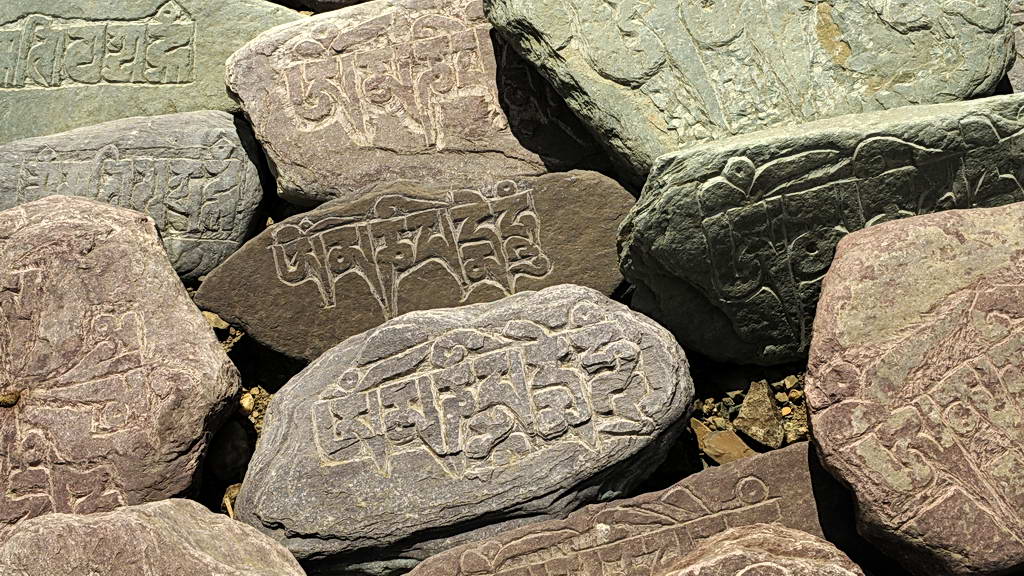
Breakfast. Today everybody can spend the day as he or she likes. There are several options. You might relax with a visit of the Diskit monastery, with a camel ride in Hundur (appr. 30 km), with a trip to Turtuk, a small village near the border to Pakistan(appr. 180 km), or taking a ride along the Nubra river to the Valley of Flowers (appr. 100 km). The kilometers are calculated for both ways. We'll meet again for supper in the evening.
Overnight on approx. 3.180 NHN
14. Day: Diskit - Pangong Lake / ca. 160 km
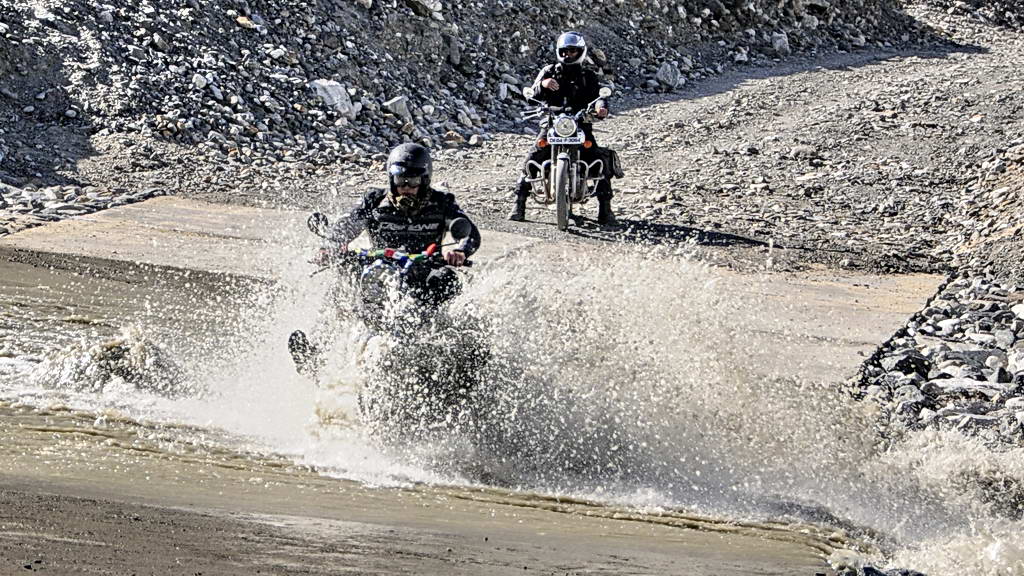
We take the direct road to the Pangong-lake. Since last dummer, this road is open.
Overnight stay in stationary camp above 4.200 NHN
15. Day: Pangong Lake - Leh / ca. 160 km
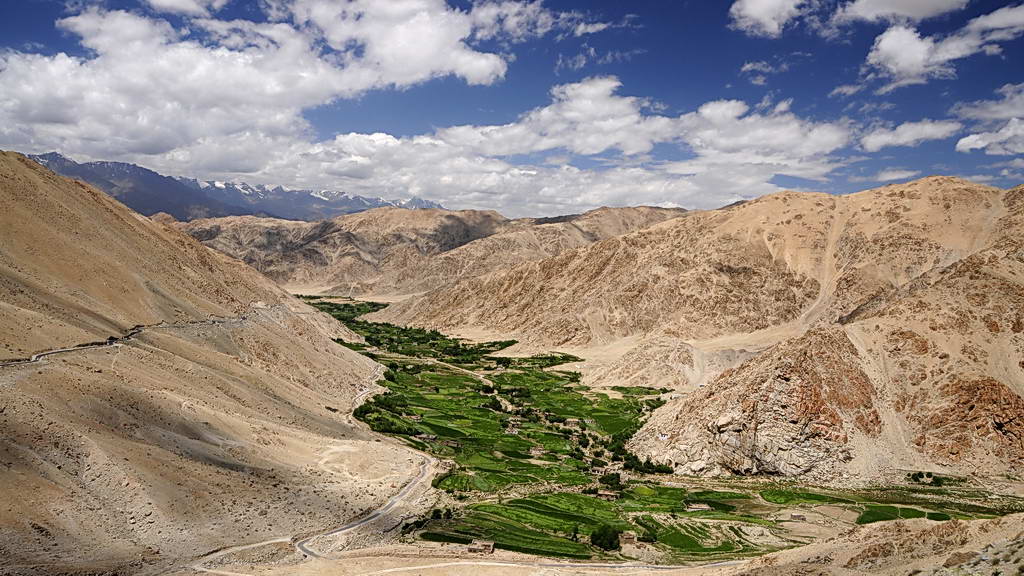
Breakfast. On our way back to Leh, we'll stop by some of the monasteries along the road. Visits of the two most famous Buddhist monasteries in Thikse and Hemis and the former royal palace in Stok are obligatory. Back in Leh, a shopping tour in the busy streets of Ladakh's capital will end the day.
Overnight on approx. 3.500 NHN
16. Day: a last day in Leh
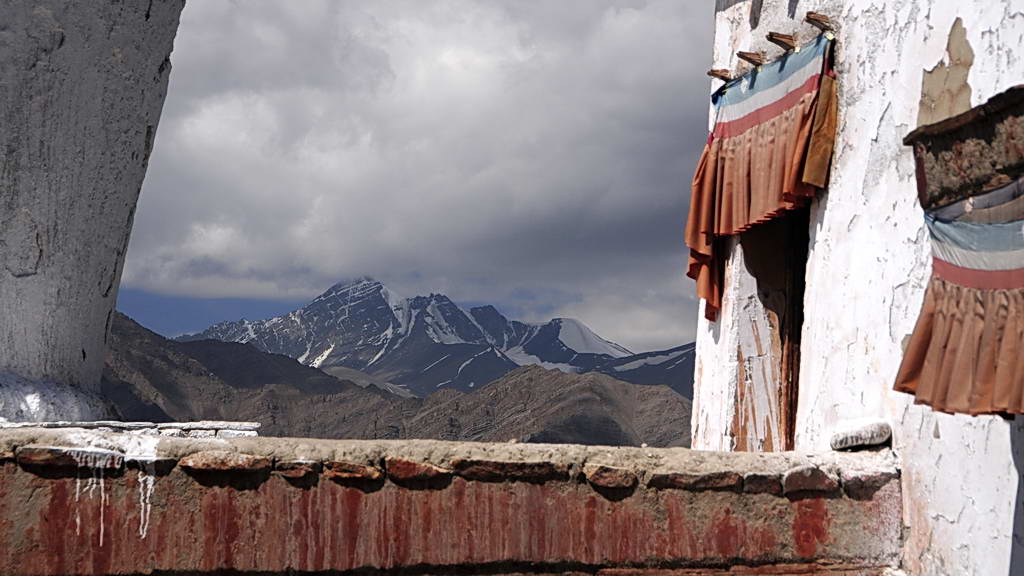
Before we go to Srinagar we spend a relaxing das in Leh. The last days we very exhausting so it's a good idea to have a day rest.
Overnight stay above 3500 NHN
17. Day: Leh - Lamayuro / ca. 115 km
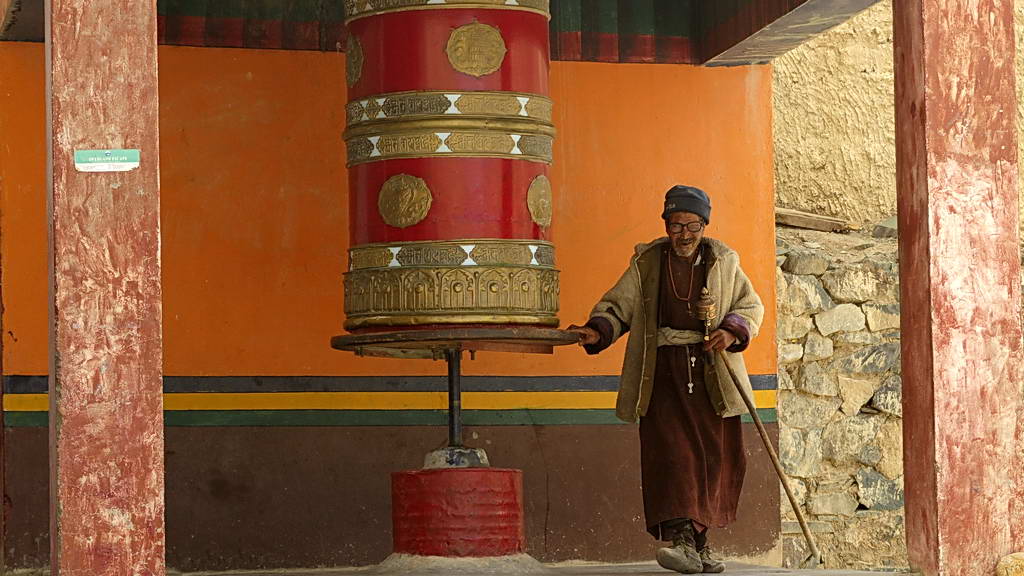
Breakfast. After a three to four hours ride along the Indus River and across spectacular gorges, we'll reach Lamayuro, site of one of the oldest Buddhist monasteries of Ladakh. From here, we have a gorgeous view over the "moon land".
Overnight on approx. 3.520 NHN
18. Day: Lamayuro - Kargil / ca. 105 km
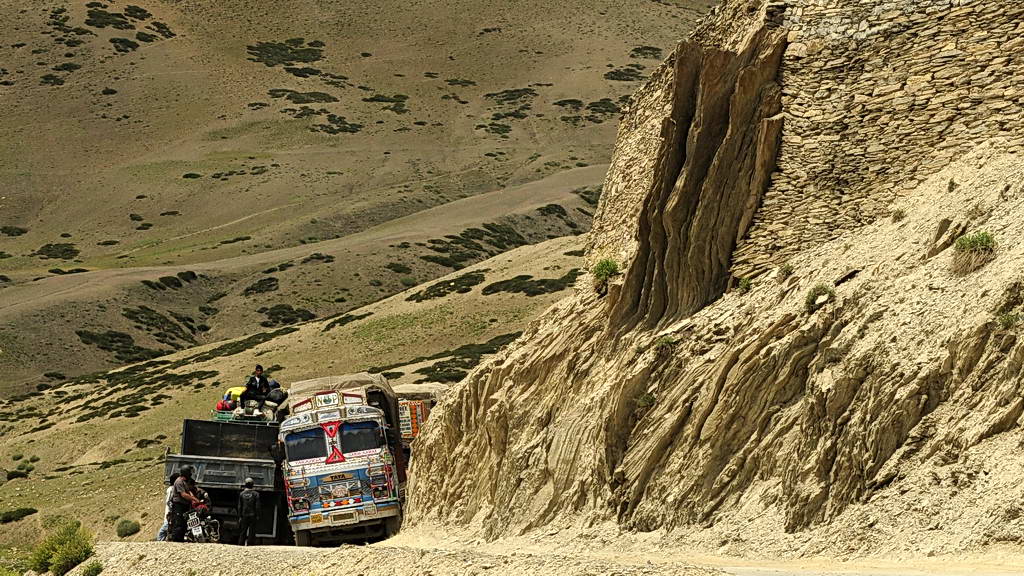
Breakfast. The further we advance in the Western direction, the more lovely the landscape will be. There is one pass on our way, the FotuLa. Soon after we'll reach Kargil. Here we'll leave the land of the Buddhists. Kargil is a Muslim town. We'll notice immediately. The streets look different, and there is no beer at all or very very expensive.
Overnight on approx. 2.700 NHN
19. Day: Kargil - Srinagar / ca. 200 km
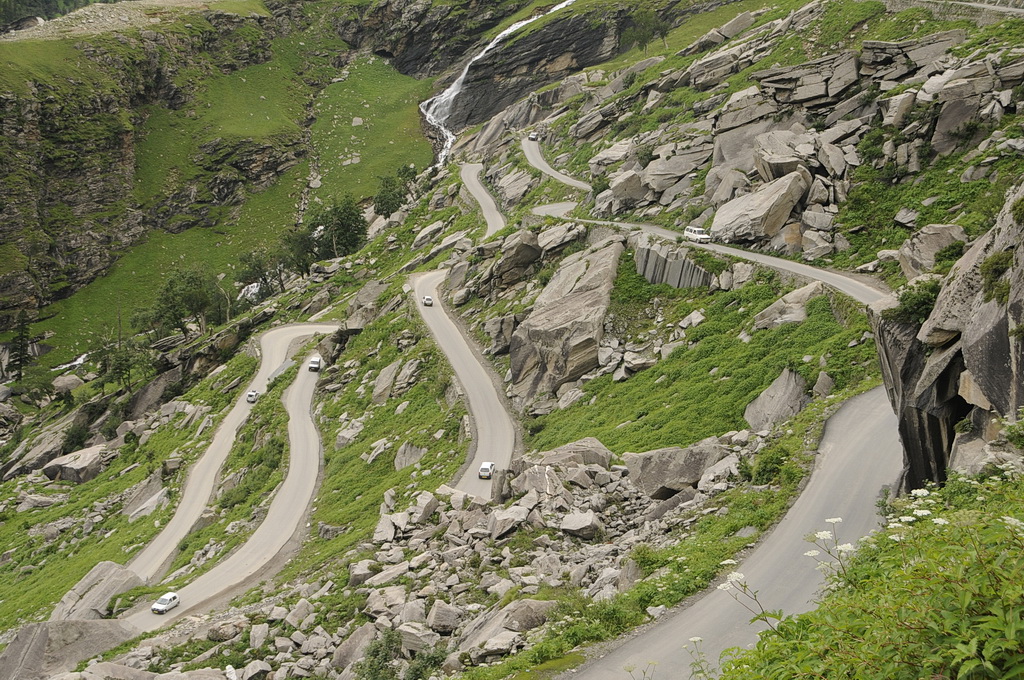
Breakfast. The last kilometers of our Himalayas adventure are in front of us. There is only one more pass, the Soji La. It might be a real challenge. The road is narrow and had never come close any asphalt. If its raining, it might get really slippery.
We continue across dense forests, wide meadows and agricultural areas. You'll soon understand why Kashmir is called the "Switzerland” of India. After a few hours, we'll arrive at the houseboats on the Nagin Lake, which is the smaller and more contemplative of the two lakes in Srinagar.
We'll spend the night on a luxurious house boat
Overnight on approx. 1.600 NHN
20. Day: Srinagar
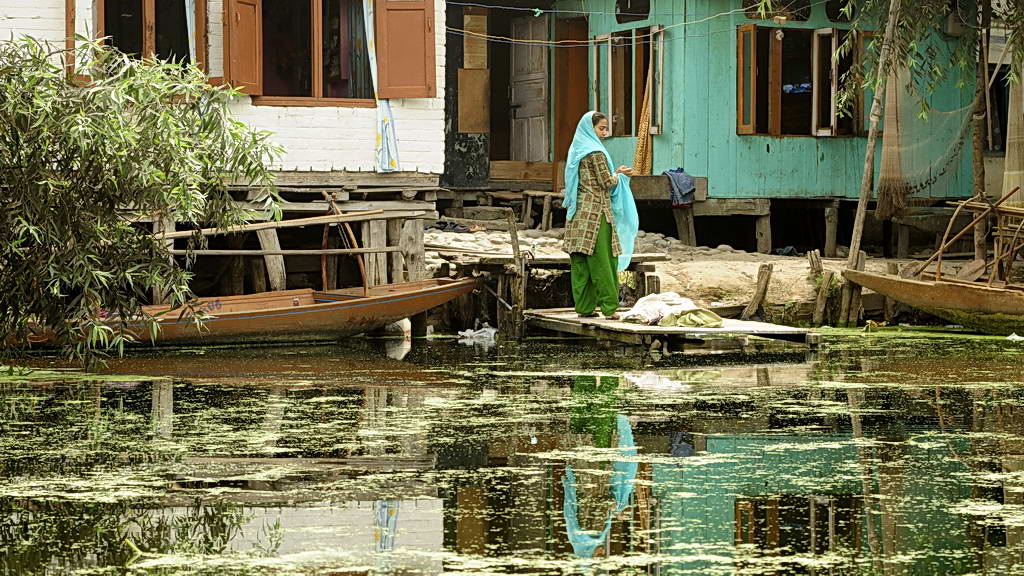
Breakfast. Today is a day for relaxation. There are several options: you might spend the whole day on the houseboat, or cross the town with a Shikara, a water taxi which is typical for Srinagar, or visit the famous Mogul Gardens, or make a shopping-tour in the bazars of Srinagar. Your physical well-being is taken care of by the houseboat owner who serves typical Kashmiri home-style cooking.
Overnight on approx. 1.600 NHN
21. Day: Srinagar
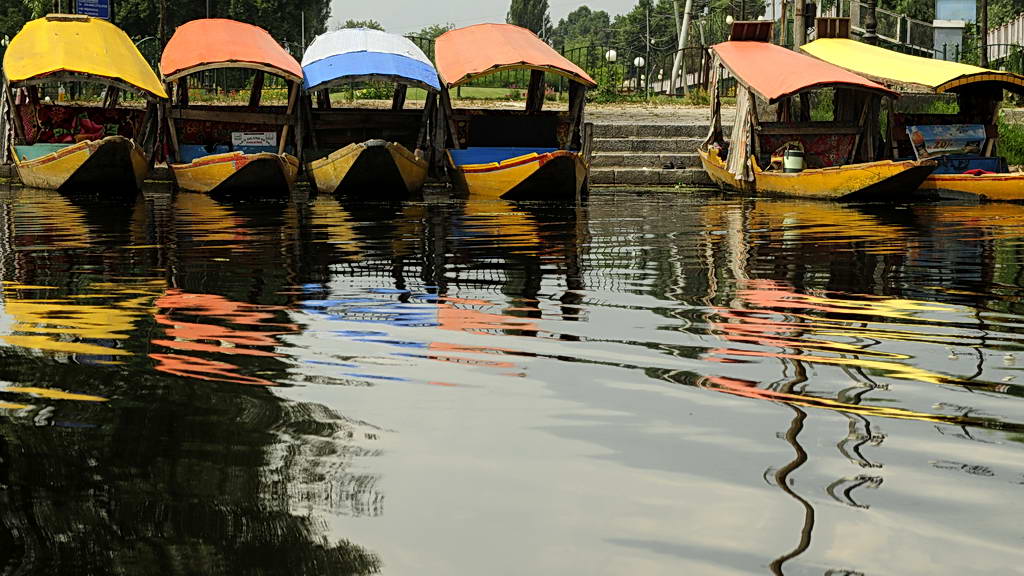
Breakfast. Our previous guests uniquely decided that the stay on the houseboat in Srinagar should be one day longer, and so we do. You may spend the day as you like. Abdul and his son Rouf will do their best to satisfy your wishes.
Overnight on approx. 1.600 NHN
22. Day: Srinagar - Delhi
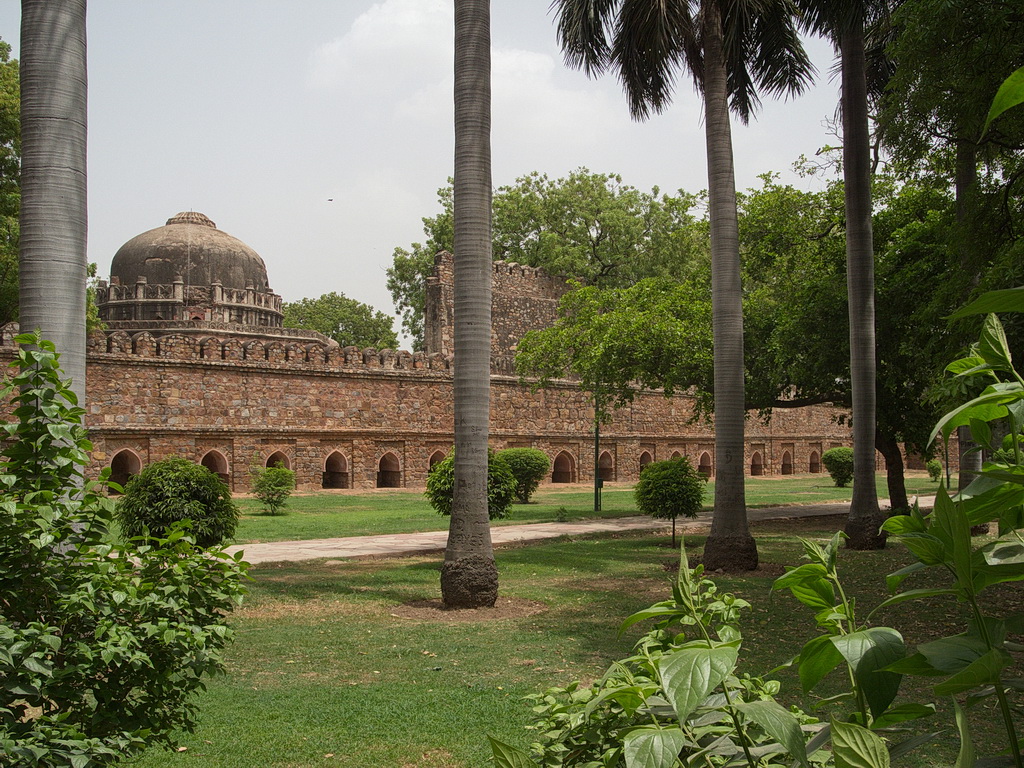
Breakfast. We'll leave Srinagar by airplane, and shortly after land on the Indira Gandhi Airport in Delhi. Depending on our flight connection, we have some time to explore the capital of India. You may freely decide what you want do. There are so many different possibilities that we will restrict ourselves to making some proposals, and you'll decide what to do.
For Taj Mahal visitors
Everybody who booked a visit to Agra after the tour will be picked up directly at the airport and brought to Agra by car.
23. Day: Flight home (or visit of the Taj Mahal)
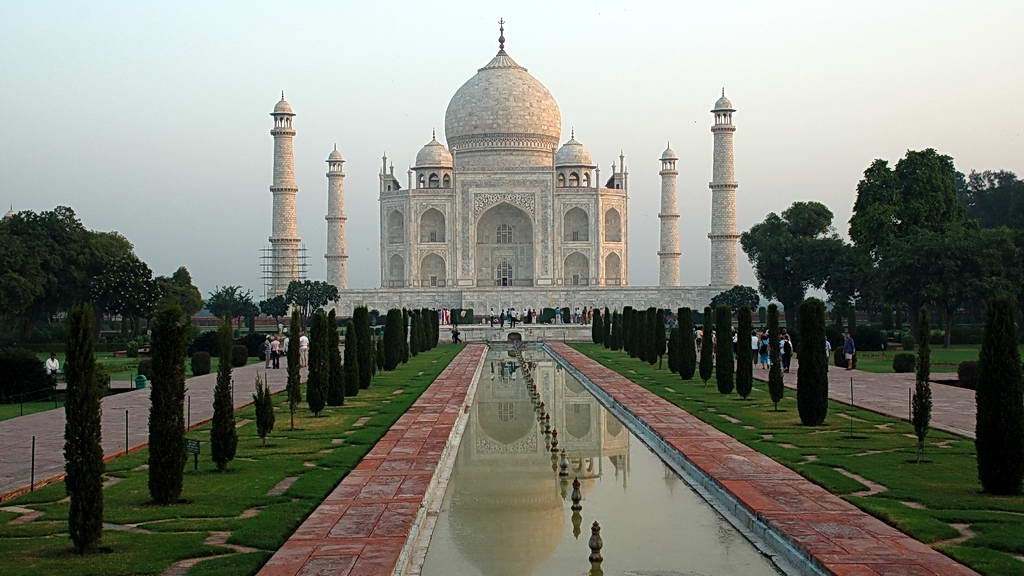
The adventure has come to an end. Sometime during the night your airplane will take you back home. Until then, you have a hotel room at your disposal.
For all Taj Mahal visitors
Early in the morning, before sunrise, we go to the Taj Mahal to admire this extraordinary miracle of Moslem architecture. Afterwards we'll have breakfast in the hotel, and then we'll take the ride back to Delhi.
24. Day: Flight home
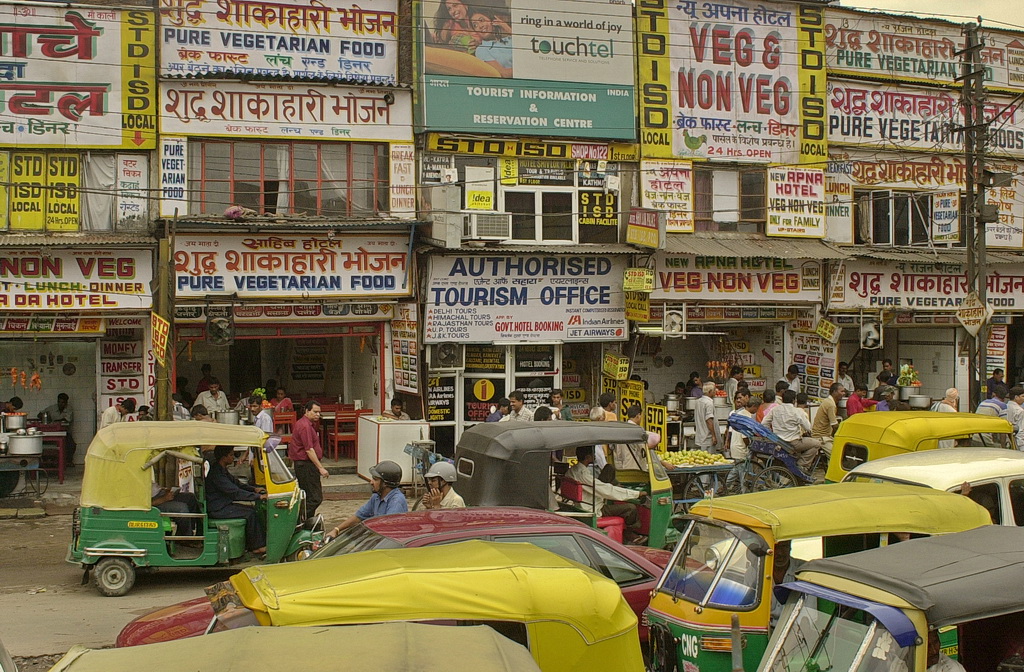
The adventure ends here also for Taj Mahal visitors. Somewhere during the night, your plane will take you home. Until departure, you have a hotel room in Delhi.
We would be glad to welcome you soon on another one of our tours in "Incredible India”, maybe in the desert state of Rajasthan or in tropical Kerala.









